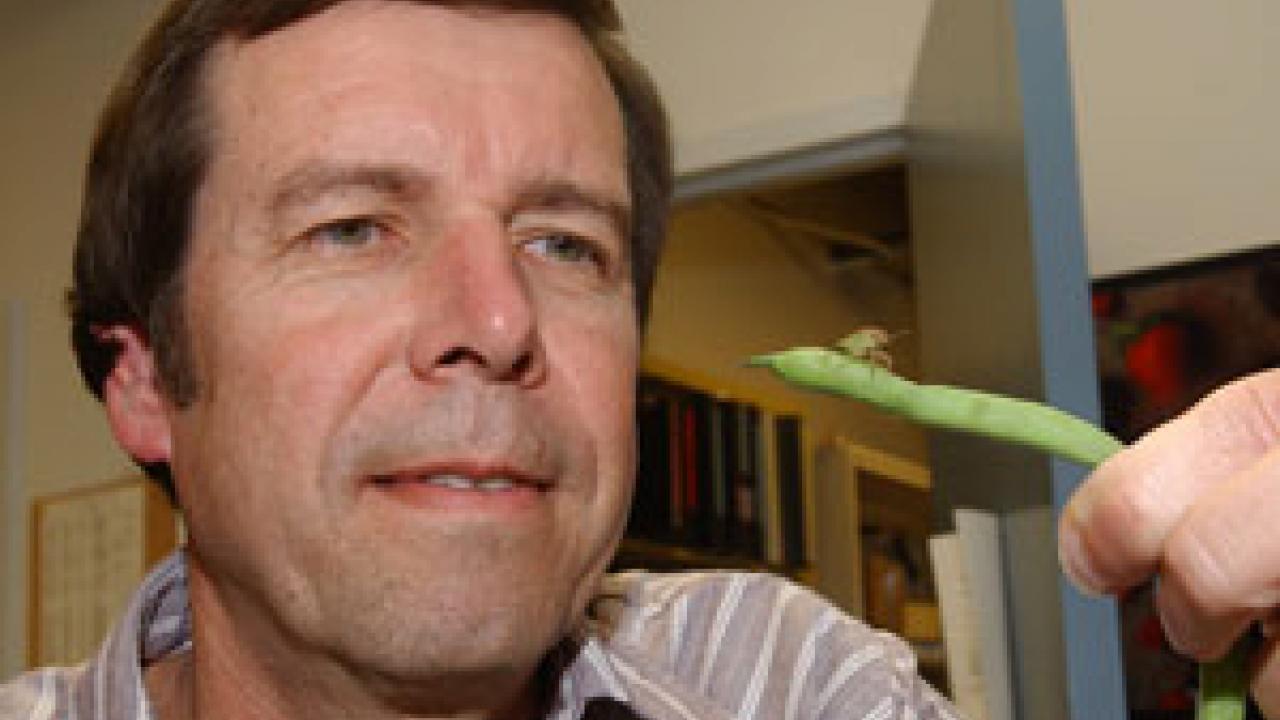Frank Zalom knows what a bug's life is all about.
Zalom, the 2004 winner of the James H. Meyer Distinguished Achievement Award, also knows how to separate the good bugs from the bad ones.
Zalom is a chief figure in the burgeoning field of IPM, or "integrated pest management." IPM is the monitoring of pests and their parasites and predators, the use of holistic farming techniques, less toxic pesticides, pest-resistant plants and genetic engineering.
The UC Davis Academic Federation will recognize Zalom with the Meyer Award on Nov. 17. The event will be held at 6 p.m. in the AGR Room at the Buehler Alumni and Visitors Center.
"IPM is applied ecology," said Zalom, an entomology professor and former director of the IPM Program at UC Davis. "It's an approach in which you look at a host of interrelated factors to manage pests.''
Zalom served as the IPM Program director at UC Davis for 15 years, working in the Cooperative Extension, mentoring graduate students, researching pest issues and sharing information with the agricultural industry.
Upon hearing of his selection for the Meyer Award, Zalom said, "I am honored to be receiving this award, but it reminds me of how fortunate I have been to have been associated with so many wonderful and talented people over the years in Cooperative Extension, the UC IPM Program, in my lab and throughout the campus community."
His colleagues attest to his productivity.
"Zalom has become a leader among the next generation of IPM researchers," wrote entomology professor Diane Ullman in her nomination. "He has been extraordinarily successful in building on the concepts framed by pioneering entomologists and moving the concept of IPM into modern agriculture."
In particular, Ullman noted, Zalom has supported the "economical and judicious use" of crop-protection products while developing the potential for sound biologically based pest management approaches. "Many of his activities have fundamentally and globally impacted IPM programs," wrote Ullman.
She credits Zalom for bringing the UC IPM Project to its current level of national and international prominence. "His outstanding management of funding and personnel resources is largely responsible for the extraordinarily strong reputation enjoyed by the UC IPM Project today."
Zalom pays tribute to "the UC IPM team for creating the innovative products coming from the program," such as award-winning IPM publications and a Web site. Farmers and pest managers have come to rely upon this "how-to" information for pest identification, monitoring and management.
He said IPM has yielded many rewards to the people of California. "It has allowed many growers as well as pest managers in urban and natural resource areas to economically transition from pest and disease control based on broad spectrum pesticides to strategies that reduce risk to the environment."
Under Zalom's administration, the UC IPM Project also provided a source of needed research funds for scientists interested in studying pest control without pesticides, understanding the ecology of pests in their environment, and developing practical solutions to pest problems.
"Maintaining the quality of agricultural products and keeping them plentiful and affordable while addressing environmental risk has benefits for all Californians," said Zalom. His current research and extension activities support this philosophy.
Zalom's research has taken him around the world, including to the former Czechoslovakia, Spain, Kenya, Egypt, Cameroon and Australia. He has also helped organize several large multidisciplinary studies with other UC Davis faculty including the Sustainable Agriculture Farming Systems Project, which examines long-term crop rotations, a cover crop systems comparison in grapes, and studies of how to mitigate runoff from orchards following winter rains.
Zalom, though, shares the accolades widely. "UC IPM has been a focus of the UC system for 25 years, and its staff has done an outstanding job of making research-based IPM information understandable for people."
Media Resources
Clifton B. Parker, Dateline, (530) 752-1932, cparker@ucdavis.edu
